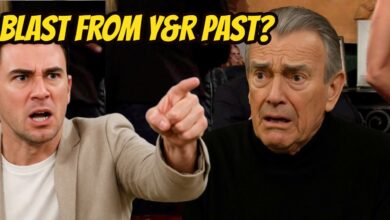Y&R Spoilers Shock Aristotle Dumas arrives in Genoa after Martin’s arrest -Victor prepares for death
The Young and the Restless spoilers title the looming shadow of Aristotle Deas in the turbulent world of Genoa City, where alliances shift as quickly as the wind and every whispered rumor carries the weight of destiny. A dark specter begins to emerge on the horizon—Aristotle Dumas.

For years, Genoa City has been a stage for long-held grudges, secret vendettas, and unexpected alliances. But nothing has prepared its denizens for the chilling arrival of an enemy whose name alone can freeze the blood.
For many years, ardent fans have speculated that Martin, the enigmatic figure whose motives and actions have often been shrouded in mystery, might be none other than Aristotle Deas incarnate. The theory was alluring—a narrative twist that seemed perfectly in tune with Genoa City’s history of hidden identities and double-crosses.
Yet, as the plot thickens, it becomes clear that Martin is not Aristotle Deas. Instead, Aristotle stands as a separate, formidable force—a nemesis whose mere mention sends shivers down the spines of those who dare to recall the traumas of the past.
Victor, the iron-willed patriarch and titan of industry, is perhaps the most haunted by the mention of Aristotle Deas. To him, Aristotle is not just an adversary; he is a living embodiment of past horrors—a harbinger of unresolved conflicts that once tore his world apart.
Victor’s fear is palpable, mixed with a seething hatred that has been building for years. His face pales at the mere thought of Aristotle, for he knows all too well that Aristotle possesses the uncanny ability to unravel even the most meticulously laid plans. Solving complications that others have left to fester, this ability—while seemingly a blessing to some—is a curse in Victor’s eyes, a reminder of the times when his empire nearly crumbled under the weight of unforeseen calamities.
It is said that Aristotle Dumas will soon set foot in Genoa City, but not before the tumultuous chapter involving Martin reaches its conclusion. The arrival of Aristotle is anticipated to mark the beginning of a new era of conflict—a fresh battle line drawn in the intricate war that has always defined Genoa City.
With Martin’s storyline gradually drawing to a close, the stage is being silently yet inexorably prepared for the next great confrontation. When Aristotle finally arrives, the balance of power is expected to shift dramatically. Victor, already wary of Aristotle’s capabilities, will find himself caught between the old guard and emerging threats.
Jack, a man whose complex history with Victor is filled with both bitter rivalry and reluctant camaraderie, will not stand idly by. Seizing the opportunity provided by this new crisis, Jack is poised to either ally with the mysterious newcomer or use his influence to further his own designs on Victor’s empire.
The tension is palpable. Will Jack join forces with Aristotle Deas to bring down Victor? Or will circumstances force Victor to call upon Jack for a temporary alliance, echoing the days when former foes united against common enemies?
The strategic dynamics of Genoa City have always been a delicate balance of power—where alliances are as fluid as shifting sands and betrayals are woven into the very fabric of everyday life.
In this volatile environment, Michael—an ambitious and calculating player in this grand game—watches the developments with bated breath. Michael’s curiosity borders on obsession; he is desperate to uncover the true identity and motivations of this new enemy.
What is Aristotle Dumas’s ultimate goal in Genoa City? What dark designs has he crafted behind his enigmatic persona?
Michael’s questions echo in the corridors of power as he prepares for the moment when he can finally confront the man who has long lurked in the shadows, waiting for his chance to tip the scales of destiny.
Amidst these rising tensions, Victor issues a stern warning to Michael, cautioning him against complacency.
“Do not underestimate the enemy, Michael,” Victor admonishes, his voice grave and laden with the weight of past experiences. “Aristotle Deas is not merely a name—he is a force that can dismantle the very foundations upon which we have built our lives. In this game of power and survival, arrogance is the first step to downfall.”
Victor’s warning resonates with every member of the intricate web of relationships in Genoa City. His own life has been marred by battles—both external and internal—fighting against foes who believed themselves invincible.
Now, as the specter of Aristotle Deas looms larger with each passing day, Victor finds himself haunted by memories of past betrayals and the ghosts of enemies long thought vanquished.
The stakes have never been higher, and the paths that lie ahead are fraught with peril.
The imminent arrival of Aristotle Dumas promises to redraw the map of allegiances and enmities in Genoa City. As Martin’s storyline reaches its bittersweet conclusion, a new chapter is set to begin—a chapter where old wounds may reopen and new alliances will be forged, shaped in the crucible of conflict.
In this volatile mix, Jack’s role becomes even more critical. With a cunning mind and a history of shifting loyalties, Jack is not easily categorized. He is a man who knows that in times of crisis, survival often depends on embracing the unexpected.
Whether he chooses to join forces with Aristotle or remain an independent player, watching the unfolding chaos from the sidelines, remains to be seen.
On the other side of this high-stakes equation stands Michael, whose anticipation is tinged with both excitement and trepidation.
Michael sees in Aristotle not just an adversary, but an opportunity—a chance to unearth secrets that could redefine the power dynamics of Genoa City. His relentless pursuit of the truth drives him forward, even as he grapples with the realization that his own ambitions might inadvertently set the stage for further conflict.
Michael’s internal struggle is emblematic of the broader conflict at play—a conflict where personal vendettas and political maneuverings intersect in ways that are as unpredictable as they are dangerous.
As the days draw nearer to Aristotle Dumas’s arrival, Genoa City braces itself for the storm that is about to descend upon it. The city, long accustomed to the ebb and flow of power struggles, now faces the prospect of an upheaval that could alter its very identity.
Old alliances will be tested, new ones will form, and in the midst of this turmoil, each character must confront their own demons and make choices that will have lasting consequences.
Victor’s legacy—built on years of hard-fought battles and relentless ambition—now hangs in the balance.
Will his deep-seated fear of Aristotle Deas prove to be a weakness that his enemies can exploit? Or will his decades of experience in navigating the treacherous waters of Genoa City serve him well in the battles to come?
Meanwhile, Jack’s shifting allegiances and Michael’s insatiable curiosity add layers of complexity to an already intricate narrative—ensuring that every decision, every alliance, and every betrayal will reverberate through the corridors of power.
In the end, the story of Aristotle Deas is not just about one man’s quest for power—it is a reflection of the eternal struggle between light and darkness, between order and chaos.
Genoa City, with all its glamour and grit, stands as a microcosm of these timeless conflicts—a place where every whispered rumor, every secret meeting, and every act of defiance contributes to the grand tapestry of destiny.
As the city waits with bated breath for the moment when Martin’s saga concludes and Aristotle Deas steps onto the stage, the promise of new alliances, renewed rivalries, and the resurgence of old conflicts fills the air.
The drama is far from over. If anything, it is about to reach a fever pitch—a dramatic crescendo where the past, present, and future collide in a spectacular display of ambition, betrayal, and the unyielding quest for power.
And so, with a mixture of dread and anticipation, the residents of Genoa City prepare for the arrival of Aristotle Dumas—a man whose very presence promises to redefine the course of their lives and remind them that in this game of power, no one is ever truly safe.








